Leadership Project: Communication, Negotiation & Influence
VerifiedAdded on 2023/06/17
|10
|2815
|341
Project
AI Summary
This project provides an understanding of effective communication skills, focusing on verbal, non-verbal, written, and visual communication, and identifies different communicator types such as passive, aggressive, passive-aggressive, and assertive. It explores the author's assertive and sometimes aggressive communication style and its impact on workplace relations. The project also discusses barriers to effective communication, such as linguistic, physical, and emotional barriers, and suggests ways to overcome them. Furthermore, it highlights the role of emotional intelligence in management, different negotiation techniques (distributive and integrative), and the importance of basic negotiation skills like communication, problem-solving, planning, and emotional intelligence. The report also defines personal influence and outlines essential skills for influencing behavior in organizations, concluding with a practical example of using influencing skills to achieve workplace objectives.

Project
Paraphrase This Document
Need a fresh take? Get an instant paraphrase of this document with our AI Paraphraser
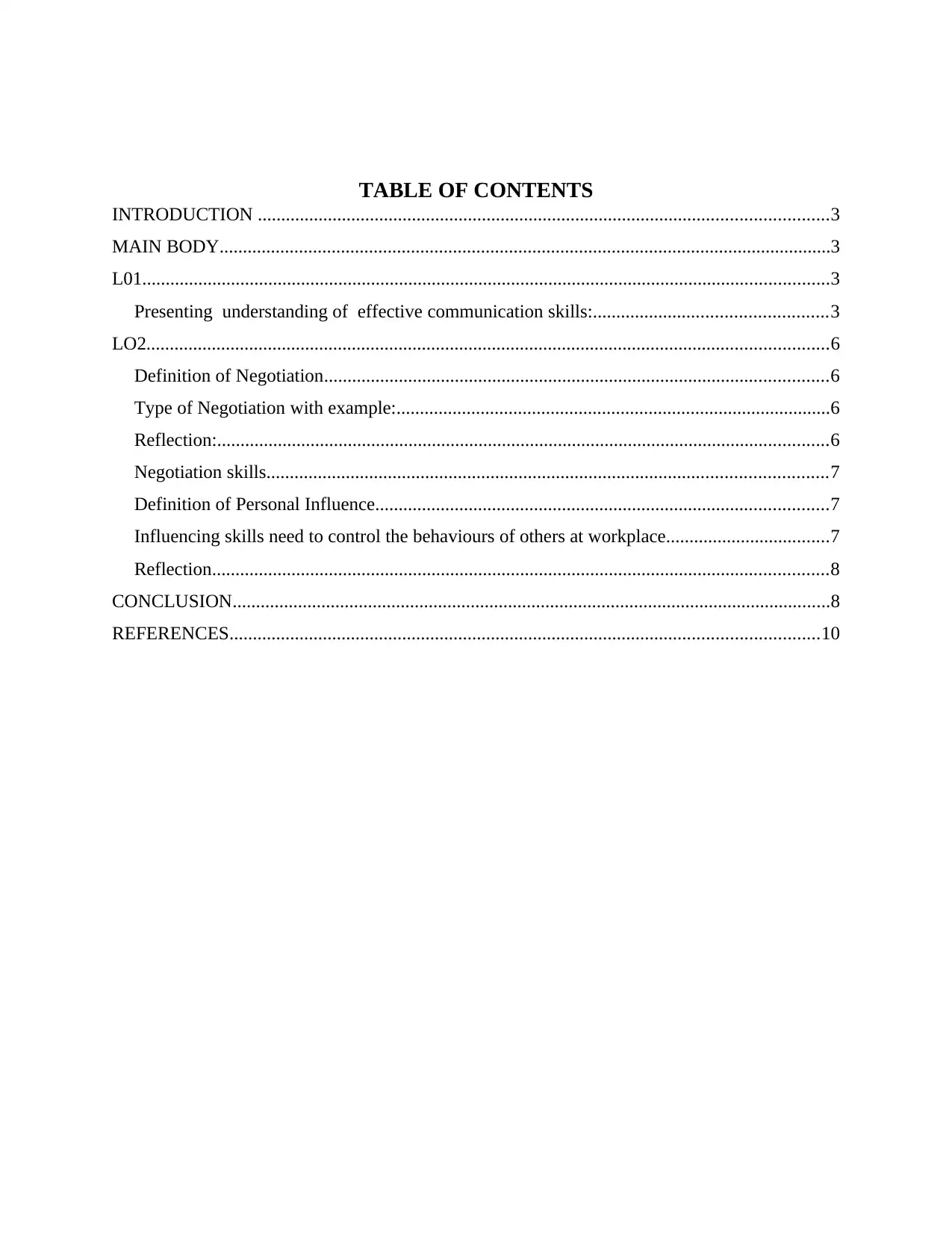
TABLE OF CONTENTS
INTRODUCTION ..........................................................................................................................3
MAIN BODY...................................................................................................................................3
L01...................................................................................................................................................3
Presenting understanding of effective communication skills:..................................................3
LO2..................................................................................................................................................6
Definition of Negotiation............................................................................................................6
Type of Negotiation with example:.............................................................................................6
Reflection:...................................................................................................................................6
Negotiation skills........................................................................................................................7
Definition of Personal Influence.................................................................................................7
Influencing skills need to control the behaviours of others at workplace...................................7
Reflection....................................................................................................................................8
CONCLUSION................................................................................................................................8
REFERENCES..............................................................................................................................10
INTRODUCTION ..........................................................................................................................3
MAIN BODY...................................................................................................................................3
L01...................................................................................................................................................3
Presenting understanding of effective communication skills:..................................................3
LO2..................................................................................................................................................6
Definition of Negotiation............................................................................................................6
Type of Negotiation with example:.............................................................................................6
Reflection:...................................................................................................................................6
Negotiation skills........................................................................................................................7
Definition of Personal Influence.................................................................................................7
Influencing skills need to control the behaviours of others at workplace...................................7
Reflection....................................................................................................................................8
CONCLUSION................................................................................................................................8
REFERENCES..............................................................................................................................10
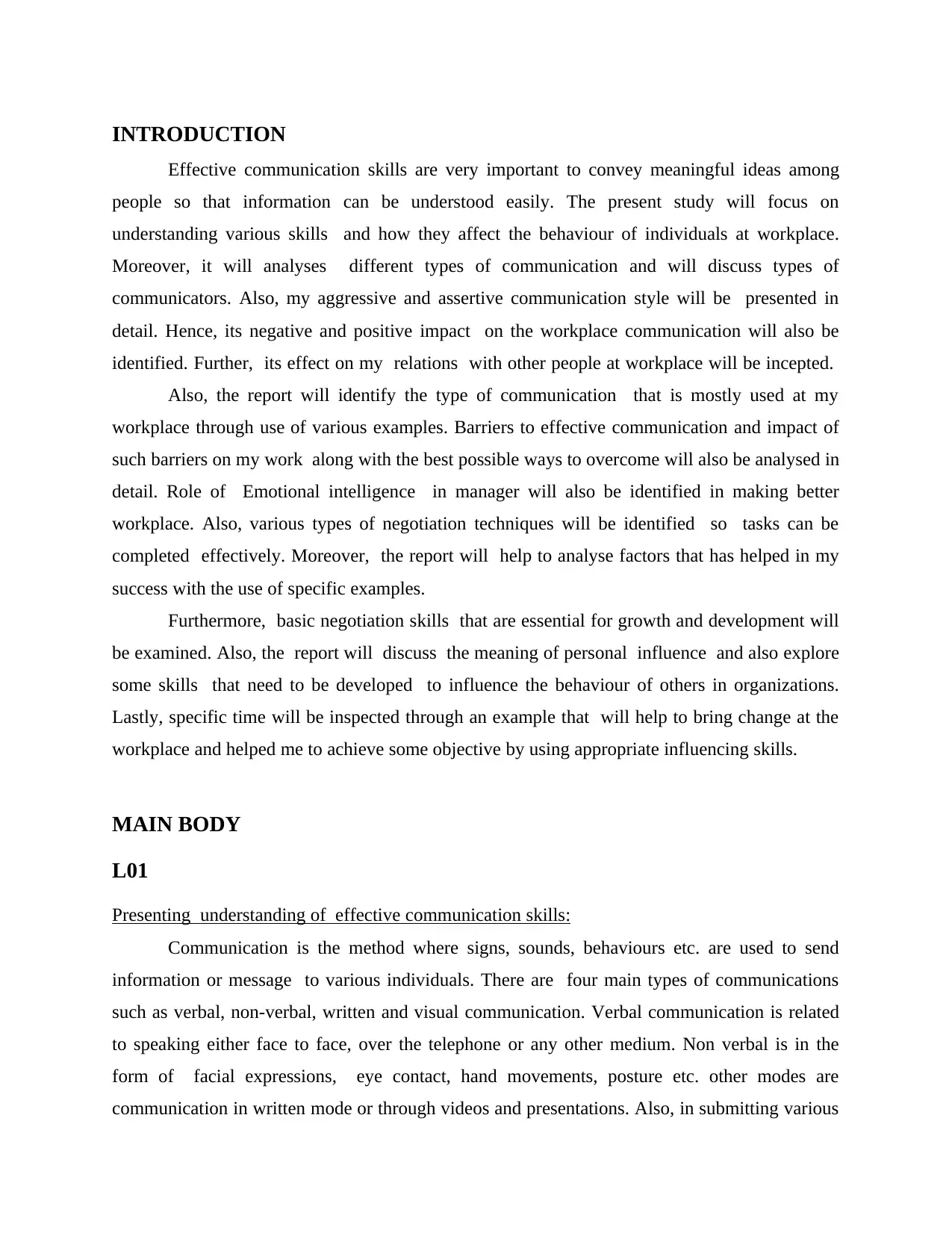
INTRODUCTION
Effective communication skills are very important to convey meaningful ideas among
people so that information can be understood easily. The present study will focus on
understanding various skills and how they affect the behaviour of individuals at workplace.
Moreover, it will analyses different types of communication and will discuss types of
communicators. Also, my aggressive and assertive communication style will be presented in
detail. Hence, its negative and positive impact on the workplace communication will also be
identified. Further, its effect on my relations with other people at workplace will be incepted.
Also, the report will identify the type of communication that is mostly used at my
workplace through use of various examples. Barriers to effective communication and impact of
such barriers on my work along with the best possible ways to overcome will also be analysed in
detail. Role of Emotional intelligence in manager will also be identified in making better
workplace. Also, various types of negotiation techniques will be identified so tasks can be
completed effectively. Moreover, the report will help to analyse factors that has helped in my
success with the use of specific examples.
Furthermore, basic negotiation skills that are essential for growth and development will
be examined. Also, the report will discuss the meaning of personal influence and also explore
some skills that need to be developed to influence the behaviour of others in organizations.
Lastly, specific time will be inspected through an example that will help to bring change at the
workplace and helped me to achieve some objective by using appropriate influencing skills.
MAIN BODY
L01
Presenting understanding of effective communication skills:
Communication is the method where signs, sounds, behaviours etc. are used to send
information or message to various individuals. There are four main types of communications
such as verbal, non-verbal, written and visual communication. Verbal communication is related
to speaking either face to face, over the telephone or any other medium. Non verbal is in the
form of facial expressions, eye contact, hand movements, posture etc. other modes are
communication in written mode or through videos and presentations. Also, in submitting various
Effective communication skills are very important to convey meaningful ideas among
people so that information can be understood easily. The present study will focus on
understanding various skills and how they affect the behaviour of individuals at workplace.
Moreover, it will analyses different types of communication and will discuss types of
communicators. Also, my aggressive and assertive communication style will be presented in
detail. Hence, its negative and positive impact on the workplace communication will also be
identified. Further, its effect on my relations with other people at workplace will be incepted.
Also, the report will identify the type of communication that is mostly used at my
workplace through use of various examples. Barriers to effective communication and impact of
such barriers on my work along with the best possible ways to overcome will also be analysed in
detail. Role of Emotional intelligence in manager will also be identified in making better
workplace. Also, various types of negotiation techniques will be identified so tasks can be
completed effectively. Moreover, the report will help to analyse factors that has helped in my
success with the use of specific examples.
Furthermore, basic negotiation skills that are essential for growth and development will
be examined. Also, the report will discuss the meaning of personal influence and also explore
some skills that need to be developed to influence the behaviour of others in organizations.
Lastly, specific time will be inspected through an example that will help to bring change at the
workplace and helped me to achieve some objective by using appropriate influencing skills.
MAIN BODY
L01
Presenting understanding of effective communication skills:
Communication is the method where signs, sounds, behaviours etc. are used to send
information or message to various individuals. There are four main types of communications
such as verbal, non-verbal, written and visual communication. Verbal communication is related
to speaking either face to face, over the telephone or any other medium. Non verbal is in the
form of facial expressions, eye contact, hand movements, posture etc. other modes are
communication in written mode or through videos and presentations. Also, in submitting various
⊘ This is a preview!⊘
Do you want full access?
Subscribe today to unlock all pages.

Trusted by 1+ million students worldwide
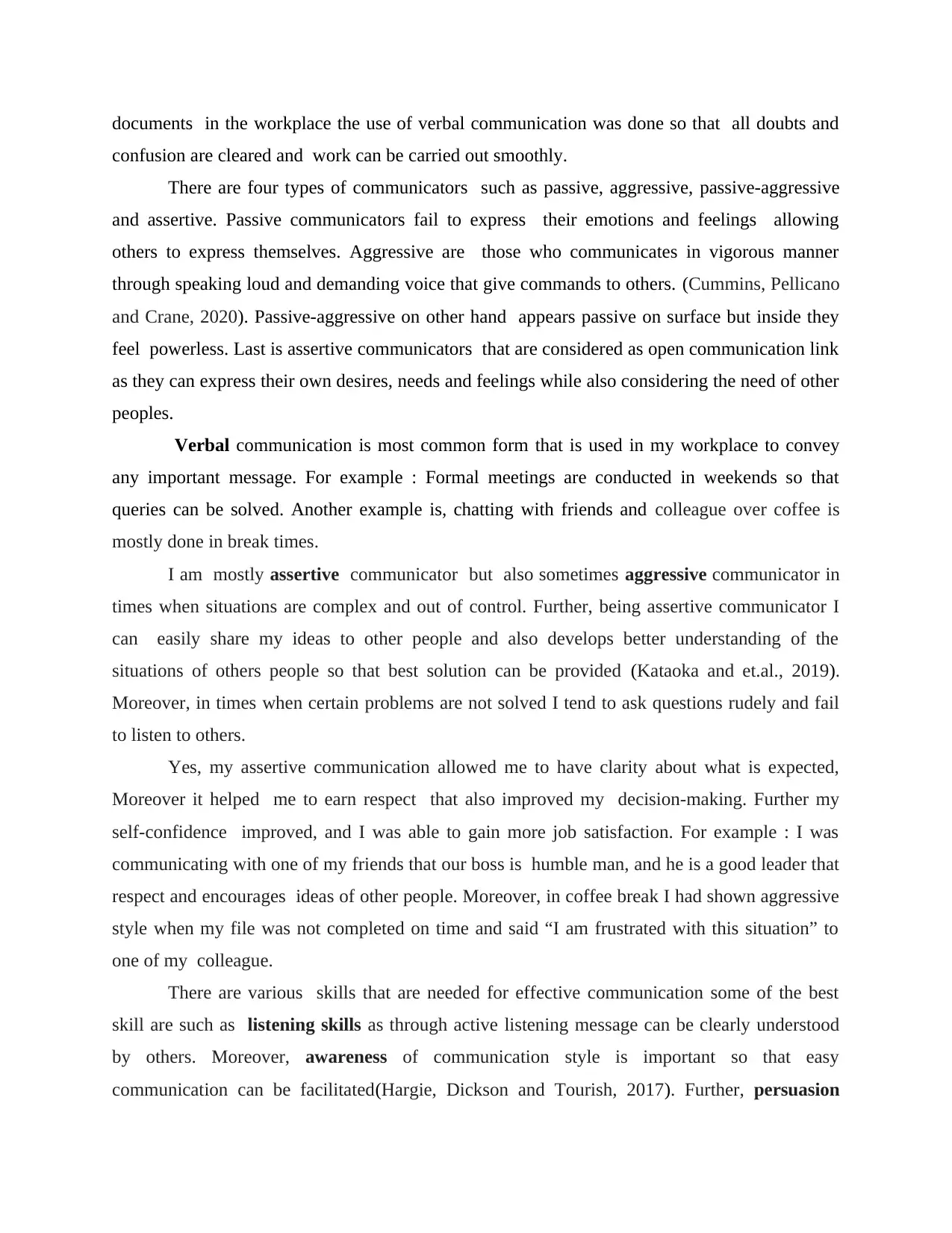
documents in the workplace the use of verbal communication was done so that all doubts and
confusion are cleared and work can be carried out smoothly.
There are four types of communicators such as passive, aggressive, passive-aggressive
and assertive. Passive communicators fail to express their emotions and feelings allowing
others to express themselves. Aggressive are those who communicates in vigorous manner
through speaking loud and demanding voice that give commands to others. (Cummins, Pellicano
and Crane, 2020). Passive-aggressive on other hand appears passive on surface but inside they
feel powerless. Last is assertive communicators that are considered as open communication link
as they can express their own desires, needs and feelings while also considering the need of other
peoples.
Verbal communication is most common form that is used in my workplace to convey
any important message. For example : Formal meetings are conducted in weekends so that
queries can be solved. Another example is, chatting with friends and colleague over coffee is
mostly done in break times.
I am mostly assertive communicator but also sometimes aggressive communicator in
times when situations are complex and out of control. Further, being assertive communicator I
can easily share my ideas to other people and also develops better understanding of the
situations of others people so that best solution can be provided (Kataoka and et.al., 2019).
Moreover, in times when certain problems are not solved I tend to ask questions rudely and fail
to listen to others.
Yes, my assertive communication allowed me to have clarity about what is expected,
Moreover it helped me to earn respect that also improved my decision-making. Further my
self-confidence improved, and I was able to gain more job satisfaction. For example : I was
communicating with one of my friends that our boss is humble man, and he is a good leader that
respect and encourages ideas of other people. Moreover, in coffee break I had shown aggressive
style when my file was not completed on time and said “I am frustrated with this situation” to
one of my colleague.
There are various skills that are needed for effective communication some of the best
skill are such as listening skills as through active listening message can be clearly understood
by others. Moreover, awareness of communication style is important so that easy
communication can be facilitated(Hargie, Dickson and Tourish, 2017). Further, persuasion
confusion are cleared and work can be carried out smoothly.
There are four types of communicators such as passive, aggressive, passive-aggressive
and assertive. Passive communicators fail to express their emotions and feelings allowing
others to express themselves. Aggressive are those who communicates in vigorous manner
through speaking loud and demanding voice that give commands to others. (Cummins, Pellicano
and Crane, 2020). Passive-aggressive on other hand appears passive on surface but inside they
feel powerless. Last is assertive communicators that are considered as open communication link
as they can express their own desires, needs and feelings while also considering the need of other
peoples.
Verbal communication is most common form that is used in my workplace to convey
any important message. For example : Formal meetings are conducted in weekends so that
queries can be solved. Another example is, chatting with friends and colleague over coffee is
mostly done in break times.
I am mostly assertive communicator but also sometimes aggressive communicator in
times when situations are complex and out of control. Further, being assertive communicator I
can easily share my ideas to other people and also develops better understanding of the
situations of others people so that best solution can be provided (Kataoka and et.al., 2019).
Moreover, in times when certain problems are not solved I tend to ask questions rudely and fail
to listen to others.
Yes, my assertive communication allowed me to have clarity about what is expected,
Moreover it helped me to earn respect that also improved my decision-making. Further my
self-confidence improved, and I was able to gain more job satisfaction. For example : I was
communicating with one of my friends that our boss is humble man, and he is a good leader that
respect and encourages ideas of other people. Moreover, in coffee break I had shown aggressive
style when my file was not completed on time and said “I am frustrated with this situation” to
one of my colleague.
There are various skills that are needed for effective communication some of the best
skill are such as listening skills as through active listening message can be clearly understood
by others. Moreover, awareness of communication style is important so that easy
communication can be facilitated(Hargie, Dickson and Tourish, 2017). Further, persuasion
Paraphrase This Document
Need a fresh take? Get an instant paraphrase of this document with our AI Paraphraser
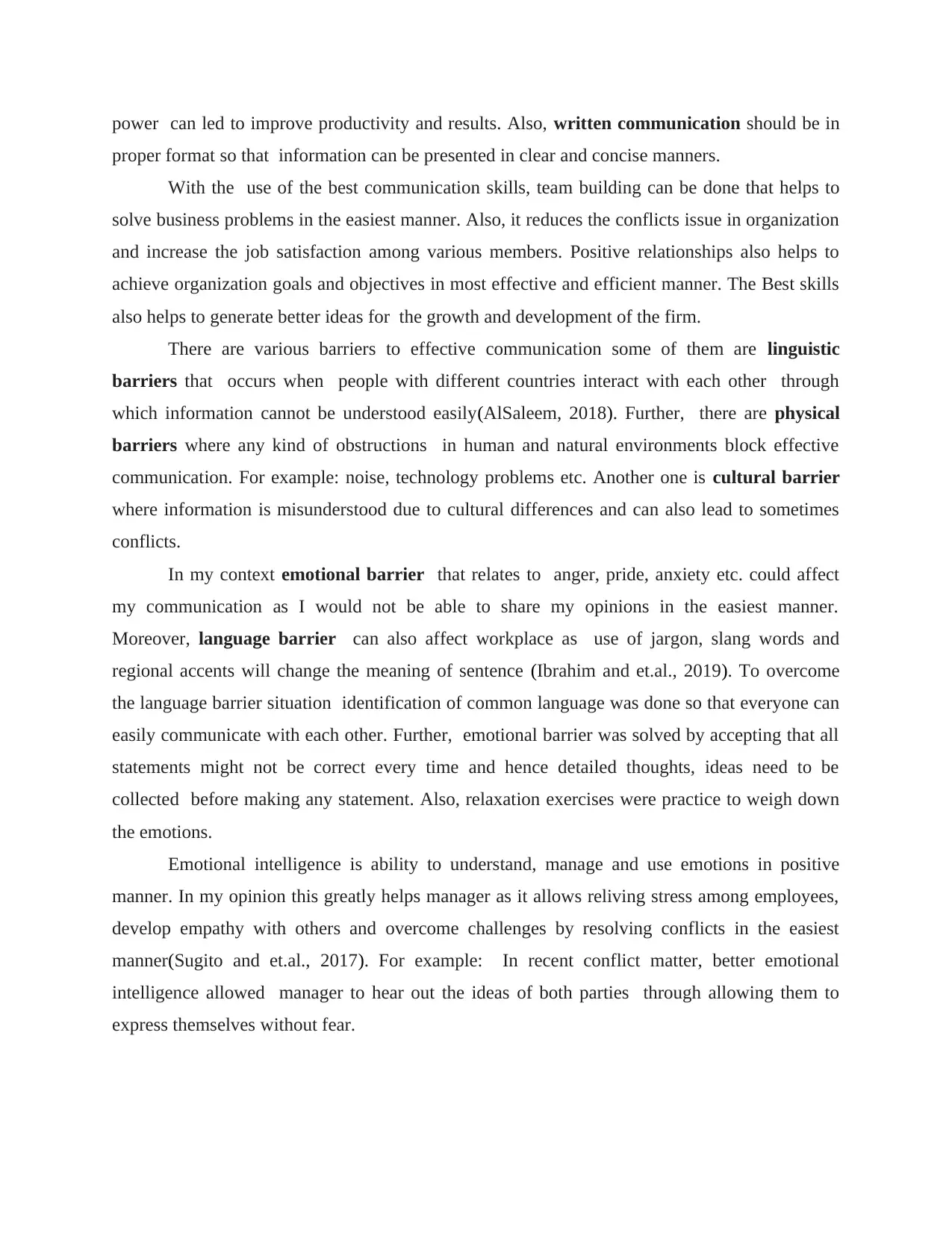
power can led to improve productivity and results. Also, written communication should be in
proper format so that information can be presented in clear and concise manners.
With the use of the best communication skills, team building can be done that helps to
solve business problems in the easiest manner. Also, it reduces the conflicts issue in organization
and increase the job satisfaction among various members. Positive relationships also helps to
achieve organization goals and objectives in most effective and efficient manner. The Best skills
also helps to generate better ideas for the growth and development of the firm.
There are various barriers to effective communication some of them are linguistic
barriers that occurs when people with different countries interact with each other through
which information cannot be understood easily(AlSaleem, 2018). Further, there are physical
barriers where any kind of obstructions in human and natural environments block effective
communication. For example: noise, technology problems etc. Another one is cultural barrier
where information is misunderstood due to cultural differences and can also lead to sometimes
conflicts.
In my context emotional barrier that relates to anger, pride, anxiety etc. could affect
my communication as I would not be able to share my opinions in the easiest manner.
Moreover, language barrier can also affect workplace as use of jargon, slang words and
regional accents will change the meaning of sentence (Ibrahim and et.al., 2019). To overcome
the language barrier situation identification of common language was done so that everyone can
easily communicate with each other. Further, emotional barrier was solved by accepting that all
statements might not be correct every time and hence detailed thoughts, ideas need to be
collected before making any statement. Also, relaxation exercises were practice to weigh down
the emotions.
Emotional intelligence is ability to understand, manage and use emotions in positive
manner. In my opinion this greatly helps manager as it allows reliving stress among employees,
develop empathy with others and overcome challenges by resolving conflicts in the easiest
manner(Sugito and et.al., 2017). For example: In recent conflict matter, better emotional
intelligence allowed manager to hear out the ideas of both parties through allowing them to
express themselves without fear.
proper format so that information can be presented in clear and concise manners.
With the use of the best communication skills, team building can be done that helps to
solve business problems in the easiest manner. Also, it reduces the conflicts issue in organization
and increase the job satisfaction among various members. Positive relationships also helps to
achieve organization goals and objectives in most effective and efficient manner. The Best skills
also helps to generate better ideas for the growth and development of the firm.
There are various barriers to effective communication some of them are linguistic
barriers that occurs when people with different countries interact with each other through
which information cannot be understood easily(AlSaleem, 2018). Further, there are physical
barriers where any kind of obstructions in human and natural environments block effective
communication. For example: noise, technology problems etc. Another one is cultural barrier
where information is misunderstood due to cultural differences and can also lead to sometimes
conflicts.
In my context emotional barrier that relates to anger, pride, anxiety etc. could affect
my communication as I would not be able to share my opinions in the easiest manner.
Moreover, language barrier can also affect workplace as use of jargon, slang words and
regional accents will change the meaning of sentence (Ibrahim and et.al., 2019). To overcome
the language barrier situation identification of common language was done so that everyone can
easily communicate with each other. Further, emotional barrier was solved by accepting that all
statements might not be correct every time and hence detailed thoughts, ideas need to be
collected before making any statement. Also, relaxation exercises were practice to weigh down
the emotions.
Emotional intelligence is ability to understand, manage and use emotions in positive
manner. In my opinion this greatly helps manager as it allows reliving stress among employees,
develop empathy with others and overcome challenges by resolving conflicts in the easiest
manner(Sugito and et.al., 2017). For example: In recent conflict matter, better emotional
intelligence allowed manager to hear out the ideas of both parties through allowing them to
express themselves without fear.
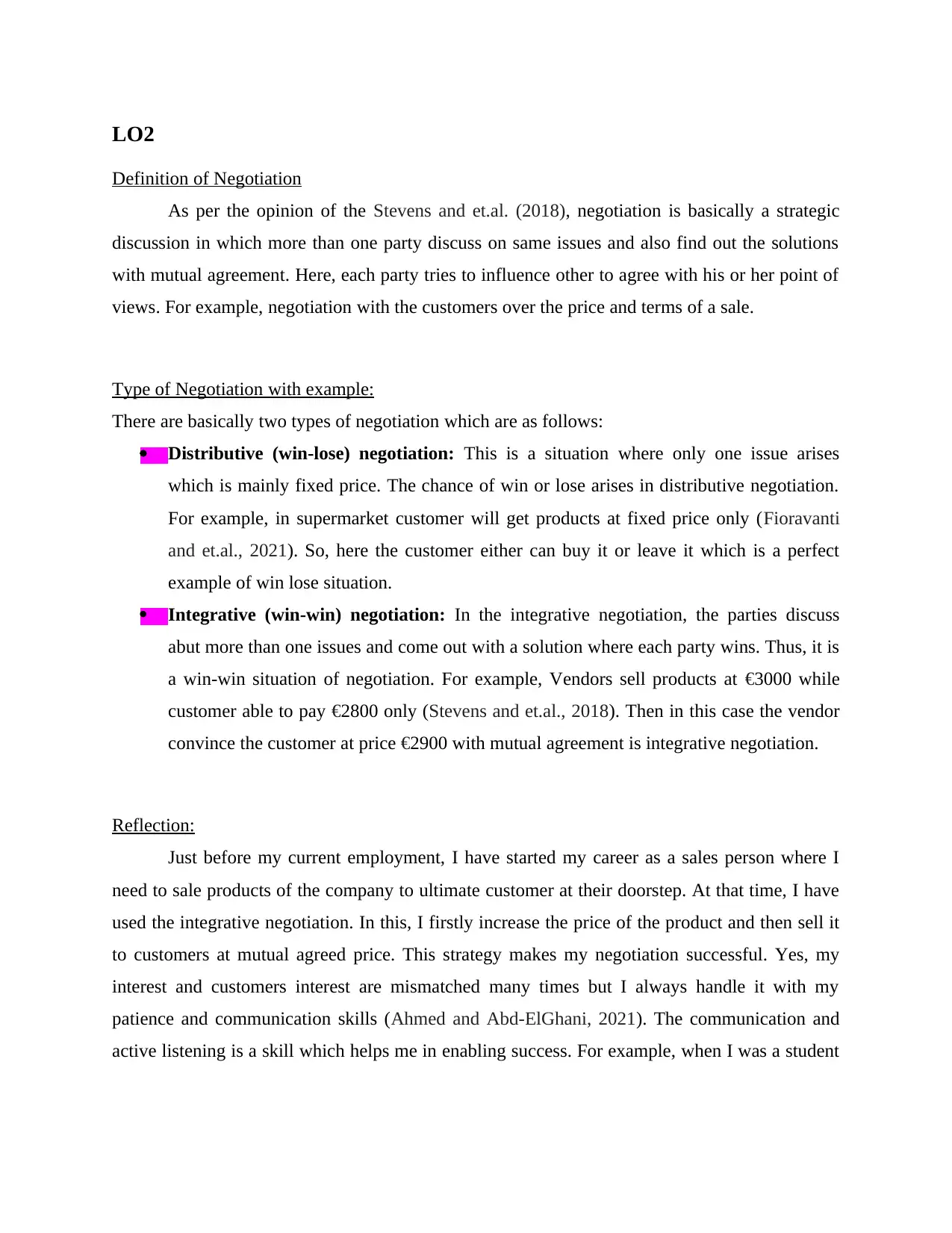
LO2
Definition of Negotiation
As per the opinion of the Stevens and et.al. (2018), negotiation is basically a strategic
discussion in which more than one party discuss on same issues and also find out the solutions
with mutual agreement. Here, each party tries to influence other to agree with his or her point of
views. For example, negotiation with the customers over the price and terms of a sale.
Type of Negotiation with example:
There are basically two types of negotiation which are as follows:
Distributive (win-lose) negotiation: This is a situation where only one issue arises
which is mainly fixed price. The chance of win or lose arises in distributive negotiation.
For example, in supermarket customer will get products at fixed price only (Fioravanti
and et.al., 2021). So, here the customer either can buy it or leave it which is a perfect
example of win lose situation.
Integrative (win-win) negotiation: In the integrative negotiation, the parties discuss
abut more than one issues and come out with a solution where each party wins. Thus, it is
a win-win situation of negotiation. For example, Vendors sell products at €3000 while
customer able to pay €2800 only (Stevens and et.al., 2018). Then in this case the vendor
convince the customer at price €2900 with mutual agreement is integrative negotiation.
Reflection:
Just before my current employment, I have started my career as a sales person where I
need to sale products of the company to ultimate customer at their doorstep. At that time, I have
used the integrative negotiation. In this, I firstly increase the price of the product and then sell it
to customers at mutual agreed price. This strategy makes my negotiation successful. Yes, my
interest and customers interest are mismatched many times but I always handle it with my
patience and communication skills (Ahmed and Abd-ElGhani, 2021). The communication and
active listening is a skill which helps me in enabling success. For example, when I was a student
Definition of Negotiation
As per the opinion of the Stevens and et.al. (2018), negotiation is basically a strategic
discussion in which more than one party discuss on same issues and also find out the solutions
with mutual agreement. Here, each party tries to influence other to agree with his or her point of
views. For example, negotiation with the customers over the price and terms of a sale.
Type of Negotiation with example:
There are basically two types of negotiation which are as follows:
Distributive (win-lose) negotiation: This is a situation where only one issue arises
which is mainly fixed price. The chance of win or lose arises in distributive negotiation.
For example, in supermarket customer will get products at fixed price only (Fioravanti
and et.al., 2021). So, here the customer either can buy it or leave it which is a perfect
example of win lose situation.
Integrative (win-win) negotiation: In the integrative negotiation, the parties discuss
abut more than one issues and come out with a solution where each party wins. Thus, it is
a win-win situation of negotiation. For example, Vendors sell products at €3000 while
customer able to pay €2800 only (Stevens and et.al., 2018). Then in this case the vendor
convince the customer at price €2900 with mutual agreement is integrative negotiation.
Reflection:
Just before my current employment, I have started my career as a sales person where I
need to sale products of the company to ultimate customer at their doorstep. At that time, I have
used the integrative negotiation. In this, I firstly increase the price of the product and then sell it
to customers at mutual agreed price. This strategy makes my negotiation successful. Yes, my
interest and customers interest are mismatched many times but I always handle it with my
patience and communication skills (Ahmed and Abd-ElGhani, 2021). The communication and
active listening is a skill which helps me in enabling success. For example, when I was a student
⊘ This is a preview!⊘
Do you want full access?
Subscribe today to unlock all pages.

Trusted by 1+ million students worldwide
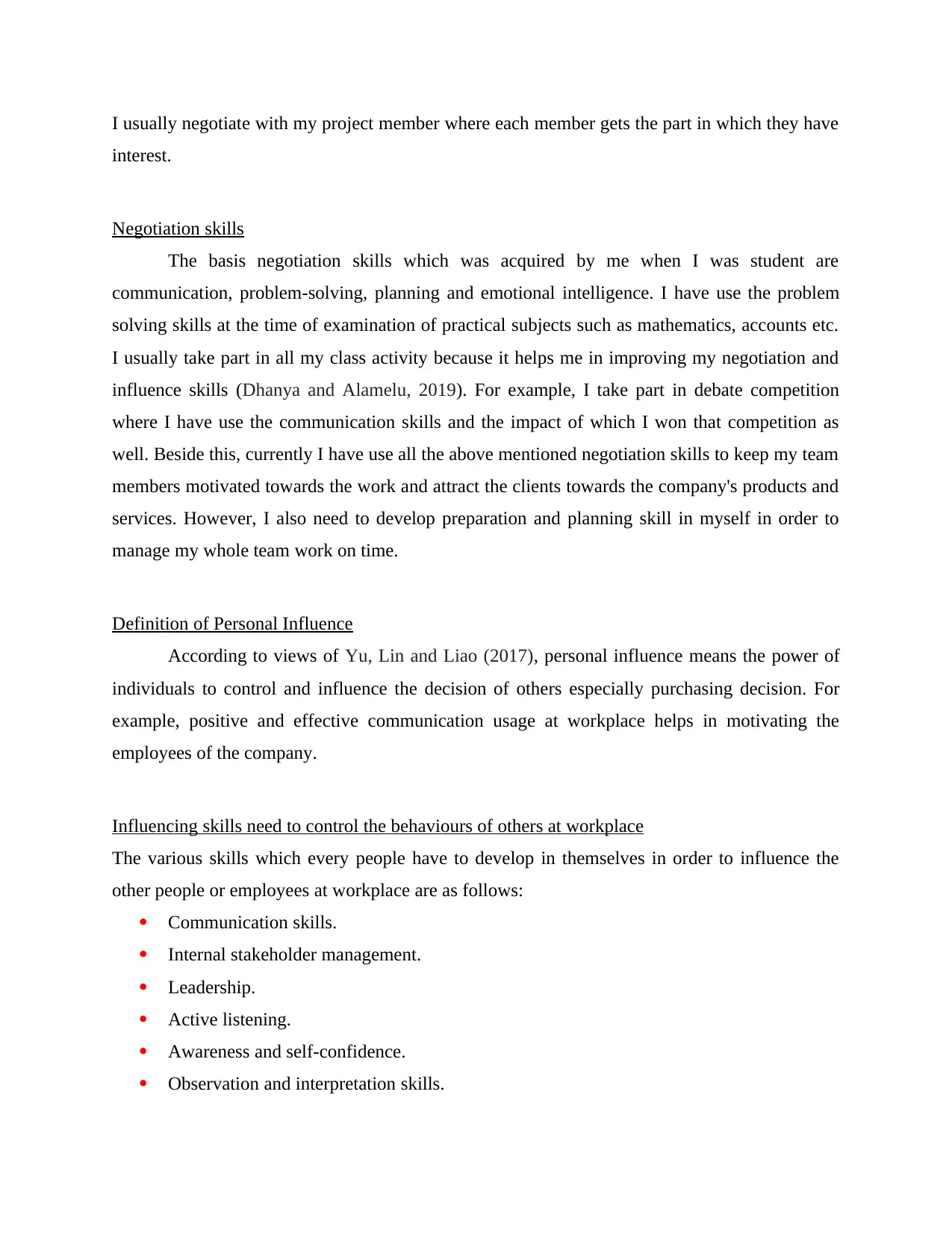
I usually negotiate with my project member where each member gets the part in which they have
interest.
Negotiation skills
The basis negotiation skills which was acquired by me when I was student are
communication, problem-solving, planning and emotional intelligence. I have use the problem
solving skills at the time of examination of practical subjects such as mathematics, accounts etc.
I usually take part in all my class activity because it helps me in improving my negotiation and
influence skills (Dhanya and Alamelu, 2019). For example, I take part in debate competition
where I have use the communication skills and the impact of which I won that competition as
well. Beside this, currently I have use all the above mentioned negotiation skills to keep my team
members motivated towards the work and attract the clients towards the company's products and
services. However, I also need to develop preparation and planning skill in myself in order to
manage my whole team work on time.
Definition of Personal Influence
According to views of Yu, Lin and Liao (2017), personal influence means the power of
individuals to control and influence the decision of others especially purchasing decision. For
example, positive and effective communication usage at workplace helps in motivating the
employees of the company.
Influencing skills need to control the behaviours of others at workplace
The various skills which every people have to develop in themselves in order to influence the
other people or employees at workplace are as follows:
Communication skills.
Internal stakeholder management.
Leadership.
Active listening.
Awareness and self-confidence.
Observation and interpretation skills.
interest.
Negotiation skills
The basis negotiation skills which was acquired by me when I was student are
communication, problem-solving, planning and emotional intelligence. I have use the problem
solving skills at the time of examination of practical subjects such as mathematics, accounts etc.
I usually take part in all my class activity because it helps me in improving my negotiation and
influence skills (Dhanya and Alamelu, 2019). For example, I take part in debate competition
where I have use the communication skills and the impact of which I won that competition as
well. Beside this, currently I have use all the above mentioned negotiation skills to keep my team
members motivated towards the work and attract the clients towards the company's products and
services. However, I also need to develop preparation and planning skill in myself in order to
manage my whole team work on time.
Definition of Personal Influence
According to views of Yu, Lin and Liao (2017), personal influence means the power of
individuals to control and influence the decision of others especially purchasing decision. For
example, positive and effective communication usage at workplace helps in motivating the
employees of the company.
Influencing skills need to control the behaviours of others at workplace
The various skills which every people have to develop in themselves in order to influence the
other people or employees at workplace are as follows:
Communication skills.
Internal stakeholder management.
Leadership.
Active listening.
Awareness and self-confidence.
Observation and interpretation skills.
Paraphrase This Document
Need a fresh take? Get an instant paraphrase of this document with our AI Paraphraser
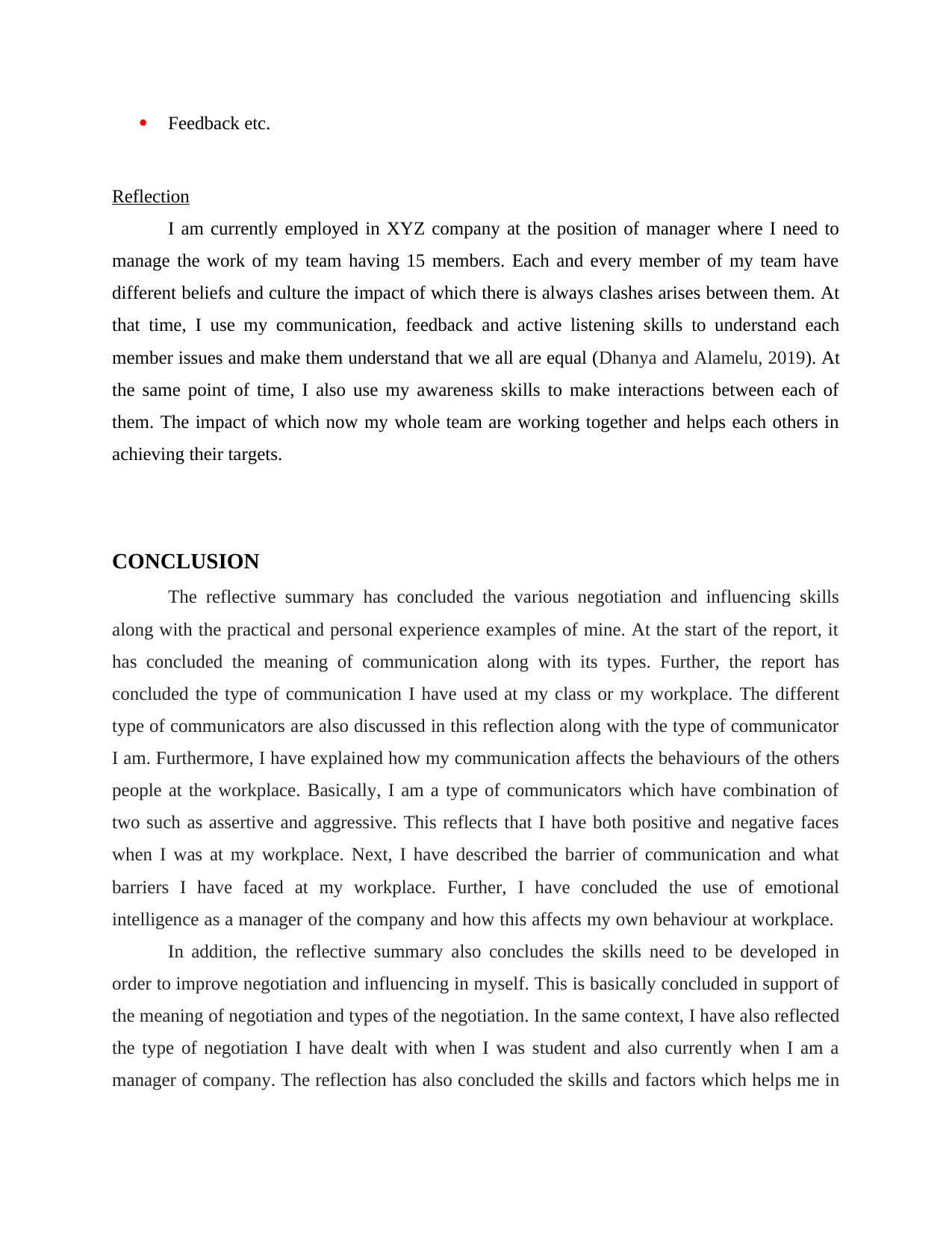
Feedback etc.
Reflection
I am currently employed in XYZ company at the position of manager where I need to
manage the work of my team having 15 members. Each and every member of my team have
different beliefs and culture the impact of which there is always clashes arises between them. At
that time, I use my communication, feedback and active listening skills to understand each
member issues and make them understand that we all are equal (Dhanya and Alamelu, 2019). At
the same point of time, I also use my awareness skills to make interactions between each of
them. The impact of which now my whole team are working together and helps each others in
achieving their targets.
CONCLUSION
The reflective summary has concluded the various negotiation and influencing skills
along with the practical and personal experience examples of mine. At the start of the report, it
has concluded the meaning of communication along with its types. Further, the report has
concluded the type of communication I have used at my class or my workplace. The different
type of communicators are also discussed in this reflection along with the type of communicator
I am. Furthermore, I have explained how my communication affects the behaviours of the others
people at the workplace. Basically, I am a type of communicators which have combination of
two such as assertive and aggressive. This reflects that I have both positive and negative faces
when I was at my workplace. Next, I have described the barrier of communication and what
barriers I have faced at my workplace. Further, I have concluded the use of emotional
intelligence as a manager of the company and how this affects my own behaviour at workplace.
In addition, the reflective summary also concludes the skills need to be developed in
order to improve negotiation and influencing in myself. This is basically concluded in support of
the meaning of negotiation and types of the negotiation. In the same context, I have also reflected
the type of negotiation I have dealt with when I was student and also currently when I am a
manager of company. The reflection has also concluded the skills and factors which helps me in
Reflection
I am currently employed in XYZ company at the position of manager where I need to
manage the work of my team having 15 members. Each and every member of my team have
different beliefs and culture the impact of which there is always clashes arises between them. At
that time, I use my communication, feedback and active listening skills to understand each
member issues and make them understand that we all are equal (Dhanya and Alamelu, 2019). At
the same point of time, I also use my awareness skills to make interactions between each of
them. The impact of which now my whole team are working together and helps each others in
achieving their targets.
CONCLUSION
The reflective summary has concluded the various negotiation and influencing skills
along with the practical and personal experience examples of mine. At the start of the report, it
has concluded the meaning of communication along with its types. Further, the report has
concluded the type of communication I have used at my class or my workplace. The different
type of communicators are also discussed in this reflection along with the type of communicator
I am. Furthermore, I have explained how my communication affects the behaviours of the others
people at the workplace. Basically, I am a type of communicators which have combination of
two such as assertive and aggressive. This reflects that I have both positive and negative faces
when I was at my workplace. Next, I have described the barrier of communication and what
barriers I have faced at my workplace. Further, I have concluded the use of emotional
intelligence as a manager of the company and how this affects my own behaviour at workplace.
In addition, the reflective summary also concludes the skills need to be developed in
order to improve negotiation and influencing in myself. This is basically concluded in support of
the meaning of negotiation and types of the negotiation. In the same context, I have also reflected
the type of negotiation I have dealt with when I was student and also currently when I am a
manager of company. The reflection has also concluded the skills and factors which helps me in

enabling the success and what conflicts I face while negotiating with others. In this context, it is
also concluded that what strategies and solutions I have taken or adopted in order to remove such
conflicts and motivate the employees at my workplace. Lastly, I have discussed my experience
of using the influencing skills to bring changes and achieve pre-determined objectives.
also concluded that what strategies and solutions I have taken or adopted in order to remove such
conflicts and motivate the employees at my workplace. Lastly, I have discussed my experience
of using the influencing skills to bring changes and achieve pre-determined objectives.
⊘ This is a preview!⊘
Do you want full access?
Subscribe today to unlock all pages.

Trusted by 1+ million students worldwide
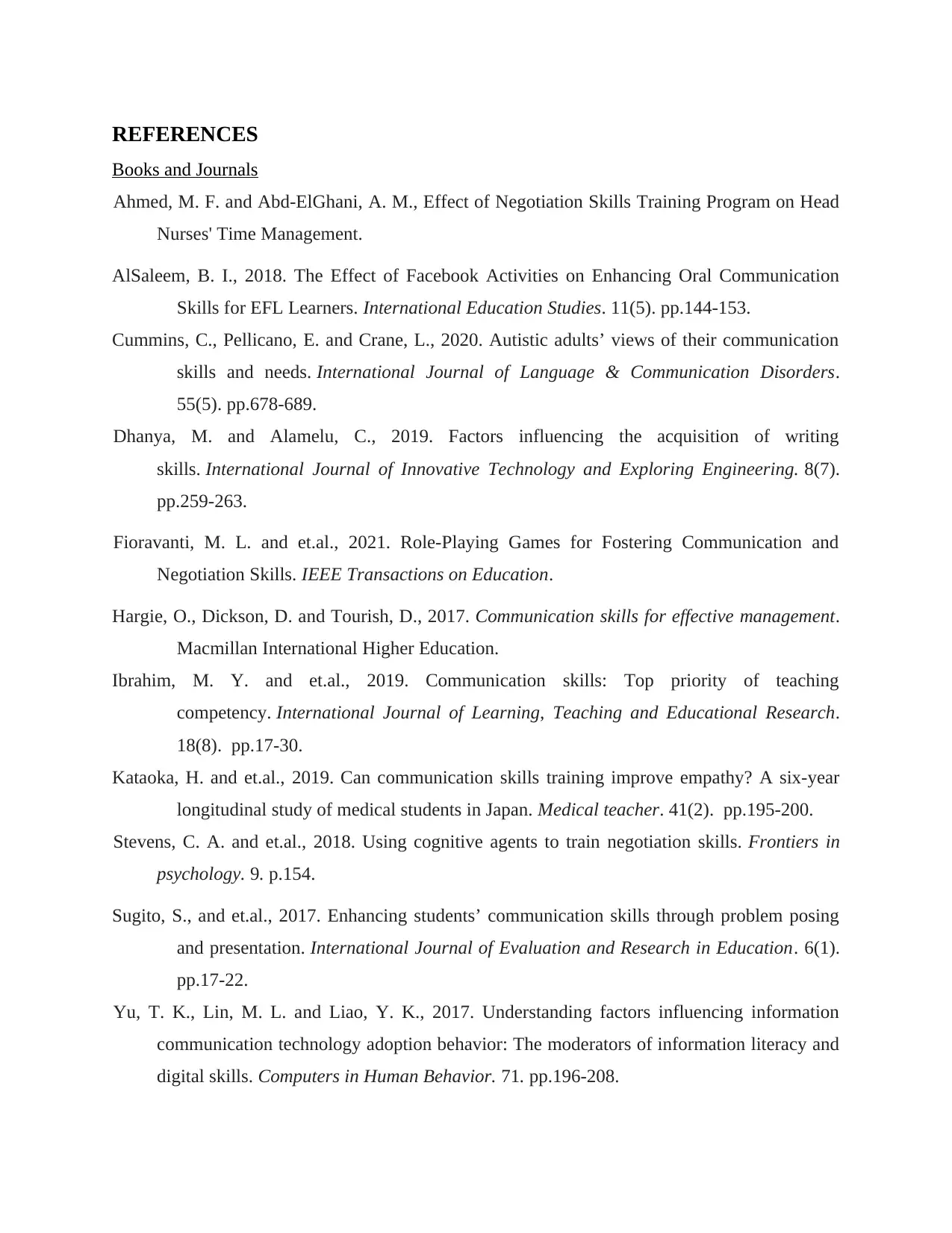
REFERENCES
Books and Journals
Ahmed, M. F. and Abd-ElGhani, A. M., Effect of Negotiation Skills Training Program on Head
Nurses' Time Management.
AlSaleem, B. I., 2018. The Effect of Facebook Activities on Enhancing Oral Communication
Skills for EFL Learners. International Education Studies. 11(5). pp.144-153.
Cummins, C., Pellicano, E. and Crane, L., 2020. Autistic adults’ views of their communication
skills and needs. International Journal of Language & Communication Disorders.
55(5). pp.678-689.
Dhanya, M. and Alamelu, C., 2019. Factors influencing the acquisition of writing
skills. International Journal of Innovative Technology and Exploring Engineering. 8(7).
pp.259-263.
Fioravanti, M. L. and et.al., 2021. Role-Playing Games for Fostering Communication and
Negotiation Skills. IEEE Transactions on Education.
Hargie, O., Dickson, D. and Tourish, D., 2017. Communication skills for effective management.
Macmillan International Higher Education.
Ibrahim, M. Y. and et.al., 2019. Communication skills: Top priority of teaching
competency. International Journal of Learning, Teaching and Educational Research.
18(8). pp.17-30.
Kataoka, H. and et.al., 2019. Can communication skills training improve empathy? A six-year
longitudinal study of medical students in Japan. Medical teacher. 41(2). pp.195-200.
Stevens, C. A. and et.al., 2018. Using cognitive agents to train negotiation skills. Frontiers in
psychology. 9. p.154.
Sugito, S., and et.al., 2017. Enhancing students’ communication skills through problem posing
and presentation. International Journal of Evaluation and Research in Education. 6(1).
pp.17-22.
Yu, T. K., Lin, M. L. and Liao, Y. K., 2017. Understanding factors influencing information
communication technology adoption behavior: The moderators of information literacy and
digital skills. Computers in Human Behavior. 71. pp.196-208.
Books and Journals
Ahmed, M. F. and Abd-ElGhani, A. M., Effect of Negotiation Skills Training Program on Head
Nurses' Time Management.
AlSaleem, B. I., 2018. The Effect of Facebook Activities on Enhancing Oral Communication
Skills for EFL Learners. International Education Studies. 11(5). pp.144-153.
Cummins, C., Pellicano, E. and Crane, L., 2020. Autistic adults’ views of their communication
skills and needs. International Journal of Language & Communication Disorders.
55(5). pp.678-689.
Dhanya, M. and Alamelu, C., 2019. Factors influencing the acquisition of writing
skills. International Journal of Innovative Technology and Exploring Engineering. 8(7).
pp.259-263.
Fioravanti, M. L. and et.al., 2021. Role-Playing Games for Fostering Communication and
Negotiation Skills. IEEE Transactions on Education.
Hargie, O., Dickson, D. and Tourish, D., 2017. Communication skills for effective management.
Macmillan International Higher Education.
Ibrahim, M. Y. and et.al., 2019. Communication skills: Top priority of teaching
competency. International Journal of Learning, Teaching and Educational Research.
18(8). pp.17-30.
Kataoka, H. and et.al., 2019. Can communication skills training improve empathy? A six-year
longitudinal study of medical students in Japan. Medical teacher. 41(2). pp.195-200.
Stevens, C. A. and et.al., 2018. Using cognitive agents to train negotiation skills. Frontiers in
psychology. 9. p.154.
Sugito, S., and et.al., 2017. Enhancing students’ communication skills through problem posing
and presentation. International Journal of Evaluation and Research in Education. 6(1).
pp.17-22.
Yu, T. K., Lin, M. L. and Liao, Y. K., 2017. Understanding factors influencing information
communication technology adoption behavior: The moderators of information literacy and
digital skills. Computers in Human Behavior. 71. pp.196-208.
1 out of 10
Related Documents
Your All-in-One AI-Powered Toolkit for Academic Success.
+13062052269
info@desklib.com
Available 24*7 on WhatsApp / Email
![[object Object]](/_next/static/media/star-bottom.7253800d.svg)
Unlock your academic potential
Copyright © 2020–2026 A2Z Services. All Rights Reserved. Developed and managed by ZUCOL.





